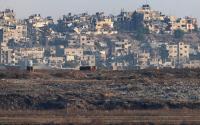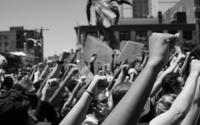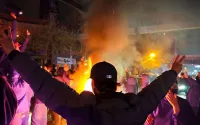23 April 2005ZnetEd Vulliamy
By tradition, an incumbent prime minister - when time comes for re-election - faces a miscellany of Monster Raving Loonies and hapless candidates from the other major parties. Tony Blair is now up against no less than 14 rivals for his Labour fortress of Sedgefield.
But this time around, with so much hanging on Mr Blair's personality and credibility, the prime minister faces one challenge more solemn and serious than usual, one which combines personal tragedy and political effervescence: that of Reg Keys, father of Lance Corporal Tom Keys, a royal military policeman, horribly killed along with five others in the Iraqi town of Majar al-Kabir in June 2003.
Tragic, because of the heavy-heartedness of the candidate and his reason for standing. Effervescent, because Mr Keys has unleashed some mercurial political energy reminiscent of that generated eight years ago in Tatton, against the Conservatives, by the white-suited former BBC reporter Martin Bell, who joined Mr Keys on the campaign trail yesterday.
"I just called up and asked to help," said Bell. "This is the kind of insurrection that restores my faith in democracy. In two weeks, this campaign has got more traction than we had in Tatton after three. The surface issues may be the NHS, education, immigration, the war or whatever. But beneath the surface, the iceberg issue is trust - and here is a man you can trust challenging a man you cannot."
It is an extraordinary candidacy, spawned by the "independent network" in British politics, in this case initiated by the musician Brian Eno, and enlisting the support of such people as Bruce Kent and other parents bereaved by the war in Iraq, who will join Mr Keys on his campaign trail tomorrow.
The contents of a private conversation with Mr Keys in a local pub after a hard day's campaigning are not really publishable, simply because they are so intimate, passionate and ridden with grief and anger over his son's death. They reveal Mr Keys as a man stricken, brave to be doing this at all. "At least I will be able to walk to Tom's grave and say that I tried to do something," he said.
The conversation emphasises the abyss between Mr Keys' situation and demeanour, and that of the country's most powerful figure, who sent L/Cpl Keys to war; it seems unbelievable the twain will meet at the polls - and share a platform when the result is announced on May 5.
"Two years ago, I wouldn't have believed it," said Mr Keys, from Solihull, for 18 years an ambulance paramedic. "I had just retired after all that blood and gore to convert a barn in Wales. I was about to embark on a sane life. Then - all this".
Before embarking on a day's doorstep canvassing on Tuesday, Mr Keys insisted that war in Iraq was "an illegal catastrophe - 35 British soldiers killed, 900 maimed and 100,000 Iraqi deaths - which cannot be swept under the carpet".
On the street, "I will be offering myself as a constituency MP people can trust and see around. And of course arguing that the £3.5bn spent on the war, with no end in sight, should be spent on health, education, the elderly and such things".
Standing against the prime minister in Blair country is not easy. Keys'campaign was refused successive vacant downtown shop fronts in their search for a headquarters, ending up on an industrial estate. A request to hold a rally at Sedgefield racecourse was refused because management feared that to grant it might prejudice a planning application lodged with the local council.
His layman's candidacy taps into a general disenchantment.
"I don't claim to be a politician," he said. "I've voted Conservative, Labour and Plaid Cymru in the past. I'll plough a straight furrow; if people ask me a question, I may not know the answer but I will damned well find out."
With the wealthier south of Sedgefield more fluid in electoral terms, Mr Keys spent Tuesday canvassing in the Labour heartland of former pit villages to the north, beginning in Fishburn.
"How come the prime minister can write a letter of condolence to Ozzy Osbourne after he falls off a quad bike, but can't write to families bereaved by the war, or visit the wounded?" he asked on the doorstep.
Here, some six out of 10 voters say they are undecided, with the remainder split between Mr Keys and Mr Blair. Daniel Boyle thought Mr Blair "a wonderful man doing a great job and standing up for his principles".
Then, out of nowhere, came an anti-Blair outburst. "I think Labour should represent people locally, instead of breaking the law right and centre, and spending all those billions on the war," said Helen Newton.
"I find it quite stressful knocking on doors," Mr Keys admitted. "When I was with the ambulance, people were just relieved to see you. But it's stressful going in cold."
"I think people want Labour but not Blair," he told Valerie Hall, in her front garden. "No trust there," replied Mrs Hall.
"Will you think of me on May 5?" asked Mr Keys.
"It's looking that way so far," was the reply.
Wednesday morning dawned, and Mr Keys - with Mr Bell, wearing, of course, the white suit - boarded a roofless double-decker bus, to drive back through the lanes into what was coal mining country, and the town of Ferryhill.
Perhaps it is a combination of Mr Keys' sincerity and bereavement, and Mr Bell's immediate recognisability and raw honesty that attracts such attention.
"Everybody's talking about this Keys man," said Julie Hymer, a home carer.
And perhaps it is Mr Keys' presence in this constituency that makes Iraq more of a factor than it seems across much of the country.
"I used to think Blair was OK, but I'm not sure now," said Marjorie Richardson. "I was against the troops going to war, and the community tax rises".
"I'm against the war," said Julian Shilbock, who works for a private ambulance firm and will vote for Mr Keys, "and there are so many lies being told, you don't know what to believe".
However, "you know nothing about politics", said one man to Mr Keys.
To which Mr Bell responds: "Politics is too important to be left to the politicians".
Finally the bus arrived in Trimdon village, Mr Blair's ward, the place the prime minister calls home in the north-east.
Over the road from the Labour Club, Simon Cross was taking a day off from his job as a psychiatric nurse.
"I haven't decided yet. I'm very sorry about that man losing his son in the war, but you sometimes think they would elect a monkey in a suit around here, so long as it was Labour."






